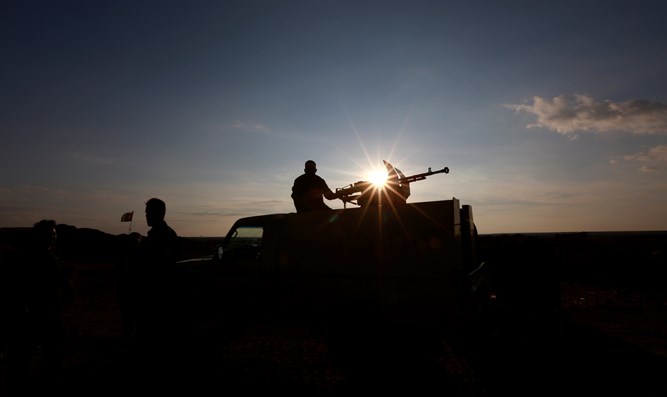The government of Iraq appears to be playing a double game with the United States and Iran over the influence of the Iranian-backed Hashd al-Shaabi umbrella organization of predominantly Shiite militias in the country.
Almost three years after a law was passed making Hash al-Shaabi integral part of the Iraqi security forces Iraqi Prime Minister Adel Abdul Mahdi issued a decree ordering the Iranian-backed organization to integrate fully into the Iraqi military and abandon previous affiliations.
Mahdi issued an ultimatum which said the offices of Hasd al-Shaabi affiliated militias had to be closed down before July 31 while the militias also must end their practice of erasing checkpoints in areas where they want to increase their influence.
Militias failing to comply with the order will be considered illegal organizations while Mahdi gave them the option to transform into political parties after abandoning their weapons.
The US Administration of President Donald J. Trump started to pressure Iraq over curbing the activities of Hashd al-Shaabi after a series of attacks on US-related targets in Iraq by militias affiliated with the umbrella organization.
The State Department, furthermore, concluded that it was the Iranian proxy in Iraq and not the Ansar Allah (Houthi) militia in Yemen which was behind a recent drone attack on Saudi Arabia.
Last week, The Wall Street Journal reported the State Department “said it had evidence that drones used in the attack originated from southern Iraq, an area filled with pro-Iran Shia jihadist groups (Hashd al-Shaabi) that fight under the command of the Islamic (Iranian) Revolutionary Guard Corps (IRGC).”
The conclusions of the State Department came after a visit by Secretary of State Mike Pompeo to Iraq where he discussed the Iranian activities in the country.
After meeting with Iraqi leaders Pompeo said he had “urged the Iraqi government, for its own security, to get all of those forces [the militias] under Iraq central control.”
Mahdi’s decree was welcomed by some Hashd al-Shaabi militias while the powerful Hezbollah brigades did not take a clear stance on the decision and instead urged the Iraqi government to crack-down on alleged spy-rings in Iraq starting with the US Embassy in Baghdad.
The Hezbollah brigades last week published audio recordings and WhatsApp chats between Mahmoud al-Falahi, the commander of Iraqi army operations in the al-Anbar Province and an unnamed CIA agent which showed that al-Falahi had given the CIA detailed coordinates of military bases in the region of the Iranian border.
Fars News, an IRGC controlled media outlet in Iran, said al-Falahi had endangered Iraq’s national security and claimed he had also delivered sensitive information to the Israeli spy agency Mossad.
Other Hashd al-Shaabi leaders defiantly vowed that they would ignore Mahdi’s order and boasted the prime minister and Americans “are dreaming” if they think they can implement the decision.
The leaders of the largest Hashd al-Shaabi factions such as Asaib Ahl al-Haq and the Badr Organization welcomed Mahdi’s decree, however.
The reason these groups are in favor of incorporating Hashd al-Shaabi as an integral part of the Iraqi military is that it would effectively transform Iraq into a second Lebanon where Hezbollah is doing Iran’s biding and is calling the shots.
Being a part of the Iraqi military would give Hashd al-Shaabi the same status as the IRGC in Iran and would give them access to sophisticated American weapons.
The US has provided over $22 billion in military aid to Iraq since 2005 and has delivered modern M1A1 tanks to the Iraqi army, for example.
There are other signs Iraq is turning into an Iranian proxy-state where the commander of the IRGC’s Quds Force, Qassem Soleimani is taking the real important decisions.
Iraq succeeded in obtaining waivers on the (oil) sanctions imposed on Iran despite being one of the most oil-rich countries in the world.
In addition, Iraq is currently establishing a new financial system which will bypass US sanctions by creating a copy of the EU’s Instex.
“The Iraqi government will continue to pay Iran for gas by depositing money into a special bank account inside Iraq, in Iraqi dinars," an Iraqi government official announced.
Last week, Iran, Iraq and Syria also signed a deal which will create a “multimodal transport corridor” from Tehran to Damascus. The deal will allow Iran to complete its land bridge from the Iranian border in the Nineveh Province in Iraq to the Syrian Golan Heights.
Then there is the big increase of Iranian exports to Iraq which have increased 20 percent over the past 100 days compared to the same period last year.
A staggering $25 million worth of goods were exported by Iran to its neighbor every day over the last three months while the Islamic Republic tries to import Iraqi products with the help of the Central Bank of Iraq.
The two countries are also in the process of establishing industrial zones near border crossings in both Iran and Iraq which will further boost economic ties.
So, does Mahdi’s decree help the United States or Iran?
The Iraqi Prime Minister owes his appointment to Hashd al-Shaabi which is part of the so-called Fatah-block and issued the order after consultations with his new chief of staff, Mohammed al-Hashimi, also known as Abu Jihad.
Al-Hashimi is affiliated with Hashd al-Shaabi and reportedly takes his orders from Qassem Soleimani, the commander of the IRGC’s Quds Force.
Source


 RSS Feed
RSS Feed